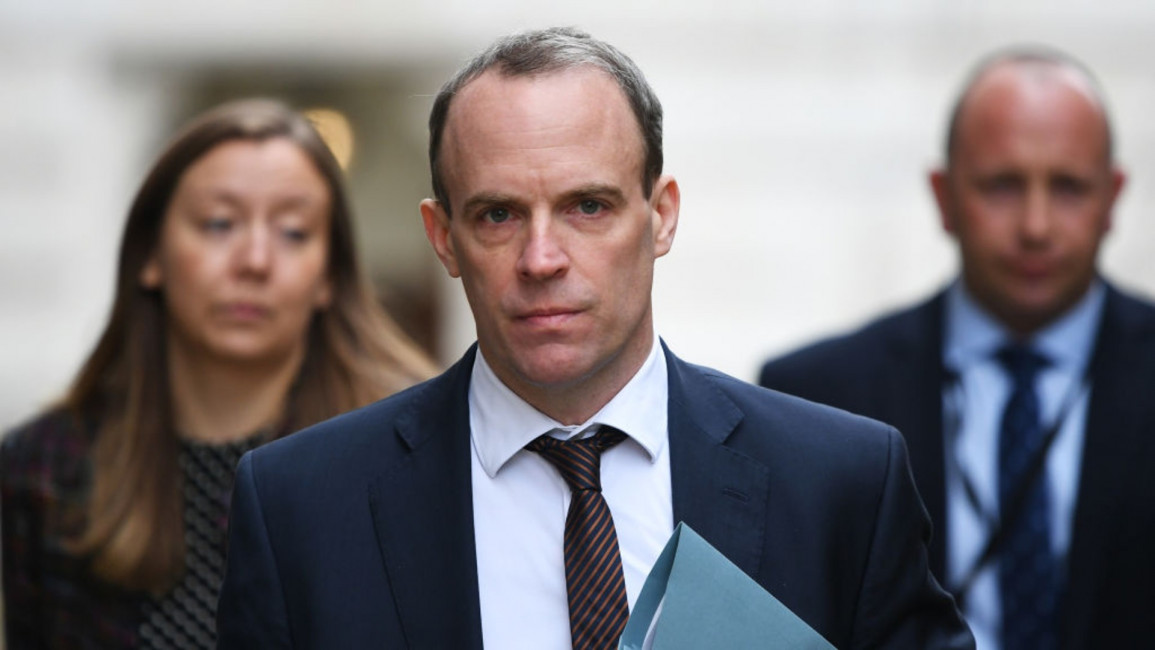
What patchy sanctions tell us about Raab's post-Brexit priorities
But the optimism felt in diplomatic circles and beyond when the first targets of British sanctions were announced has also been tempered with concern. Much of the criticism of these sanctions focuses on what shape this policy may or may not take in the future.
Let's set out the policy, for starters.
Britain has established what it calls a "ground-breaking" system, termed the "global human rights regime", intended to "stop those involved in serious human rights abuses and violations from entering the country, channelling money through UK banks, or profiting from our economy." Notably, the policy singles out individuals and organisations, rather than nations.
Foreign Office spin holds that this system of sanctions is targeted and specific, a tailored supplement to blanket national sanctions, and that it can be aimed square and true at those who deserve impeding.
As for concrete examples, the first to face sanctions announced under this new system include the murderers of Sergei Magnitsky, the Russian lawyer whose death came as he was investigating corruption, and the killers of Jamal Khashoggi, the exiled Saudi journalist.
Given the seeming total impunity and lack of accountability the Saudi government has enjoyed up until now, the move is obviously a welcome one. But as good as these opening salvos sound, here some points of disagreement begin to become more salient.
 |
Both leave unaffected Britain's significant relations with Russia and Saudi Arabia |  |
While both groups of killers are worthy targets, the British system runs the risk of being so narrow in scope as to be effectively meaningless. While these batteries of sanctions are likely to inconvenience their targets, they leave Britain's significant relations with Russia and Saudi Arabia unaffected.
Other sanctions are levied against targets in North Korea, and some of those involved in Burma's persecution of Rohingya. No human rights groups can claim these are meaningless; and narrowly they are certainly welcome. But in each case, the sanctions are so narrow in scope as to prove a pinprick rather than a sledgehammer.
They correspond to two North Korean organisations, many of which the North Korean state regularly reconstitutes and renames to dodge sanctions, and a couple of Burmese generals.
Twitter Post
|
Though these are positive developments, they are individually very small. If the human rights regime on which these sanctions are based is not thorough and automatic, the freedom of Britain to levy its own sanctions may prove inactively used, producing no good effect.
Others appear to have come to similar but distinct conclusions. Many privately wonder why, of the initial raft of targets, those who were included were chosen, and why they were not joined by others.
Read more: Khashoggi's Saudi 'killers' sanctioned by UK government
As Hong Kong is brought to heel by China, with diplomatic agreements with Britain thrown aside in the process, many Conservative members of parliament wonder why no Chinese officials have been recognised among the fairly small club of enemies of human rights collated above.
In comments made to the BBC, the foreign secretary, Dominic Raab, implied that the list would soon begin to fill up.
Those on the list would be subject to "constant review", Raab said. The Foreign Office is "working already on further designations that can be made in due course".
But on China, the foreign secretary was non-committal.
He asserted that "It's pretty clear... we are willing to stand up for our vital national interests."
But "If we want a positive relationship with China... the real issue here is one of trust and whether China can be trusted to live up to its international obligations, and its international responsibilities," Raab said.
All this, as Chinese diplomats are rather more direct on related matters. On the question of Hong Kong, where Britain has begun to offer the life raft of emigration and a pathway to British citizenship to many Hong Kong residents fearing Chinese domination, Chinese diplomats are not subtle. Britain must "bear all consequences" for helping those fleeing Hong Kong, or for considering China a "hostile country".
In Britain many are horrified by constant reports on the depredations of China's policy in Xinjiang, including urgent questions in parliament, and campaigns for further sanctions, this time on those Chinese imports allegedly made using enslaved Uighur labour.
 |
If the gaps in Raab's announcement are a prelude to not joining new sanctions in the future, Britain risks pursuing an illusory freedom |  |
These questions are specific and must be addressed, but there is also a broader, more systematic question to be asked of this new proposal. It is a question of purpose and intention.
New sanctions might indicate less a desire among British politicians to double previous punishments for abusers of human rights, than a new gesture of diplomatic freedom prompted by departing the European Union. It is the government's job to prove that either suspicion of this motivation is groundless, or that it does not matter compared to the good these measures intend and do.
If the British government is able to be more direct in sanctioning those who deserve it, and less blunted by institutional constraints, this might be welcome. There is even the possibility that Britain might be tempted to outdo other blocs and countries in aggressively sanctioning evil-doers, to prove it can, or that its policy is yet more moral than others'.
This would all be to the good.
But if the gaps in Raab's announcement are a prelude instead to detachment, and not keeping up and joining in new sanctions in the future, Britain risks pursuing an illusory freedom with no commitment to accountability and human rights.
Let us hope the list expands, and that the sanctions it contains begin to bite.
James Snell is a writer whose work has appeared in numerous international publications including The Telegraph, Prospect, National Review, NOW News, Middle East Eye and History Today.
Follow him on Twitter: @James_P_Snell
Opinions expressed in this article remain those of the author and do not necessarily represent those of The New Arab, its editorial board or staff.




